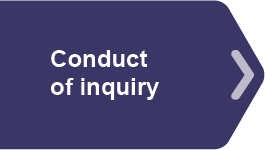Insight 9: Supporting wellbeing and safety during conduct inquiries
Adopting a human-centric approach to the inquiries meant that a critical priority for the Taskforce during the conduct of these inquiries was supporting the wellbeing of each respondent. One of the Taskforce’s early steps towards this priority was recruiting an officer to be a point of contact for individuals with wellbeing concerns.
For any employee or former employee, becoming a respondent in a Code matter is a distressing event. The circumstances surrounding the Code inquiries created additional risks for the respondents’ wellbeing. There was heavy public scrutiny of the Scheme prior to, during and after the Royal Commission. By the time the Taskforce began these inquiries, all respondents had appeared as witnesses at the Royal Commission’s public hearings. While the Code inquiries were conducted privately, some respondents expressed a sense of fatigue and a reluctance to have their conduct reviewed again. In addition to interviewing respondents, the Taskforce interviewed witnesses who, because of their roles and functions at particular times, could provide insight and context to assist the inquiries. In some cases, witnesses communicated their own wellbeing concerns, which the Taskforce also needed to manage.
For respondents that were current APS employees, their employing agency continued to offer wellbeing support. The Taskforce was responsible for offering wellbeing support to respondents who were no longer APS employees.[18] The importance of wellbeing support necessitated flexibility in processes and communication with respondents and agencies. The Taskforce considered how best to support respondents’ wellbeing and provide equitable access to wellbeing supports. The Taskforce was able to leverage the wellbeing supports offered by Telus Health, who were contracted by Services Australia to provide a wellbeing support hotline to individuals participating in the Royal Commission hearings. Telus Health were also engaged to provide a wellbeing support program which offered wellbeing checks, and up to six confidential counselling sessions.
The Taskforce implemented a number of features intended to protect individual wellbeing which are outlined in Figure 2:

|
|

|
|

|
|
Factors that were considered adverse to respondent wellbeing included the uncertain timing of critical decisions in the inquiries and the impact of the inquiries on a respondent’s employment, particularly if they had been suspended from duty without pay. Some respondents also raised the possibility of the inquiry becoming public knowledge, or needing to be disclosed to a new employer, and damaging their reputation. The latter risk to wellbeing was more pronounced for respondents who hadn’t anticipated their conduct being referred to the Commissioner for review.
Aside from influencing the timing of the inquiries, the Taskforce had limited ability to control factors adverse to respondent wellbeing. The Taskforce and Reviewer were not responsible for suspension decisions as these decisions were managed by the relevant Agency.
There is little guidance about supporting wellbeing during Code processes in the Misconduct Guide, except by implication (e.g. it contemplates the presence of a support person). This content should be reviewed in light of the Taskforce’s experience that taking deliberate and repeated steps to support wellbeing may optimise participation in the process and contribute to timely outcomes.
Footnotes
[18] See the Guidance for managing wellbeing as a result of a request to the Australian Public Service Commissioner due to an adverse finding, issued to agencies on 6 July 2023.



